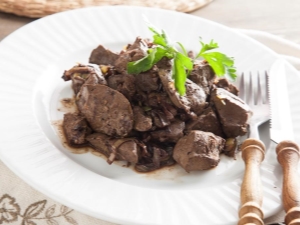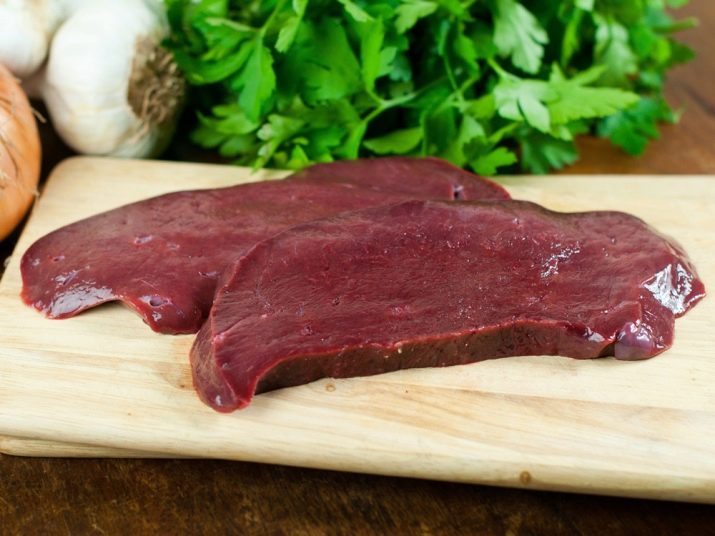Calorie content and composition of beef liver

Any product should be evaluated not only in terms of its culinary characteristics. Of great importance and overall nutritional and chemical composition.These circumstances are very important for lovers of beef liver.
Composition
Today, cow liver has become a common by-product, it is found on the shelves of any supermarkets. However, about 200 years ago, its cooking was entrusted only to top-class cooks. And they were absolutely right - the gastronomic characteristics of beef liver are due to the impressive chemical composition. It is difficult to find meat that would be more useful. 100 g of the product contains 9 mg of calcium.
And this trace element, along with the well-known property to strengthen the bones, helps stabilize blood clotting. Since injuries occur suddenly, it is very important. In addition, calcium contributes to the full conduct of nerve impulses. This improves the controllability of all organs and tissues of the human body. Thanks to 18 mg of magnesium beef liver:
- reduces the risk of kidney stones;
- increases the security of the circulatory system;
- provides splitting of sugar.
Sodium in the amount of 104 mg will help stabilize the water-salt balance and activate the production of gastric juice. Potassium in beef liver even more - 277 mg. This trace element, in addition to normalizing the work of the heart, will be able to increase the supply of oxygen to the brain. With intense mental work and constant stress, it is very important. Another 100 g of product contains:
- 314 mg of phosphorus, contributing to the development and restoration of bones, teeth;
- 239 mg of sulfur, improving cellular respiration, making the skin more elastic;
- 100 mg of chlorine, which facilitates the removal of fluids and salts from the body, which increases the production of red blood cells.
Additionally worth noting the presence of various doses:
- iodine;
- gland;
- copper;
- zinc;
- chromium;
- cobalt;
- of vitamins A, B1, B5, B12, D, E, K.
Energy and nutritional value
The calorie content of beef liver is 127 kcal per 100 grams of product. Formula BJU shows the presence of 100 g of liver 3.7 g of fat. Protein accounts for the most - almost 18 g. And carbohydrates are 5.3 g. For comparison: 71.7% of beef liver is water. There are also 1.3 g of beneficial fatty acids, and 270 mg of cholesterol, which is harmful.
The number of calories in a raw liver is noticeably less than in raw beef. Therefore, attentive nutritionists have long paid attention to this product. Yes, it can hardly be called one of the most suitable for weight loss. However, the high concentration of trace elements and vitamins largely justifies this disadvantage. Of course, when cooking in different ways to answer the question of whether a cow's liver is high in calories, each time it is particularly necessary.
Boiled product contains 115 kcal per 100 g of mass. If it is boiled for a couple, add another 10 kcal. But the liver stew contains 120 kilocalories, which is only 5 kcal more than boiled. Fried product contains 185 kcal (with onions - 188 kcal), and cooked in sour cream - 130 kcal. This difference is due to the fact that the byproduct easily and actively absorbs fatty substances.
Glycemic index
The effect of beef liver on blood sugar is determined by the method of its preparation. The glycemic index can vary from 50 to 100 points. If it is minimal, the use of the product in diabetes is fully permitted. But the crumbling in flour, the use of spices and hot spices is strictly prohibited.
Diabetics are advised to eat the liver no more than three times a week, using portions of a maximum of 150 g.
Dietary nutrition
Most nutritionists believe that there will be no harm to the body from moderate episodic consumption of beef liver. But at the same time, it should be taken into account when the overall nutritional balance is made. If there are obvious contraindications - the product is replaced with other foods rich in protein. It is allowed to eat beef liver when ordinary vegetable diets lose their effectiveness and lead to a continuous feeling of hunger.
In the morning, the liver is advised to enter the carbohydrate porridge. In the middle of the day, she will “go well” with a rice-vegetable garnish.It is recommended to add beets or pumpkins to diversify the taste of dishes. The pure form of a cow's liver is unnecessarily spicy for many people. It is recommended not to consume more than 100 g of the product per day with any diet.
You will learn more about beef liver from the following video.
























